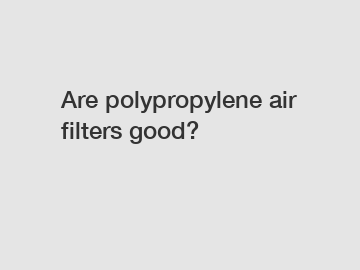Are Polypropylene Air Filters Good?
Polypropylene air filters have become increasingly popular in recent years as an alternative to traditional filters. These filters are made from a synthetic material known as polypropylene, which is known for its durability, chemical resistance, and ability to capture airborne particles effectively. In this article, we will explore the benefits and drawbacks of using polypropylene air filters to help you determine if they are the right choice for your air filtration needs.
What is Polypropylene?

Polypropylene is a thermoplastic polymer that is widely used in various applications, including packaging, textiles, and automotive components. It is known for its exceptional mechanical properties, high melting point, and resistance to chemicals and solvents. When used in air filters, polypropylene can effectively capture and retain airborne particles, including dust, allergens, bacteria, and viruses.
Benefits of Polypropylene Air Filters.
1. High Efficiency: Polypropylene air filters have a high particle capture efficiency, meaning they can effectively remove a wide range of airborne contaminants from the air. These filters have a dense, multi-layered structure with fine fibers that can trap even the smallest particles.
2. Durability: Polypropylene is a durable material that can withstand regular use and maintain its efficiency for an extended period. These filters are resistant to moisture, chemicals, and microbial growth, ensuring long-lasting performance.
3. Easy Maintenance: Polypropylene air filters are relatively easy to maintain. They can be vacuumed or washed to remove accumulated particles, allowing for reuse. This makes them a cost-effective option in the long run, as they can be used multiple times before needing replacement.
4. Allergen Reduction: Polypropylene filters are excellent at reducing allergens in the air, such as pollen, pet dander, and mold spores. This makes them particularly beneficial for individuals with allergies or asthma, as they can help provide cleaner air and alleviate symptoms.
Drawbacks of Polypropylene Air Filters.
1. Initial Cost: One of the main drawbacks of polypropylene air filters is their higher initial cost compared to traditional filters. However, considering their durability and reusability, they tend to be a cost-effective option in the long term.
2. Airflow Restriction: Due to their dense structure, polypropylene air filters may cause some restriction to the airflow in HVAC systems. This can lead to increased energy consumption and reduced system performance. It is essential to choose the right filter size and consult with professionals to ensure compatibility with your specific system.
Conclusion.
Polypropylene air filters offer numerous benefits, such as high efficiency, durability, and allergen reduction. While they may have a higher initial cost and potential airflow restriction, their long-term cost-effectiveness and superior filtration capabilities make them an attractive choice for many households and commercial settings.
If you want to improve your indoor air quality and are considering polypropylene air filters, it is advisable to consult with professionals who can provide expert guidance based on your specific needs. Contact us today to learn more about polypropylene air filters and find the perfect solution for your air filtration requirements.
Are you interested in learning more about photocatalyst filter brazil, ac filters wholesale, photocatalyst air filter supplier? Contact us today to secure an expert consultation!



Comments
Please Join Us to post.
0